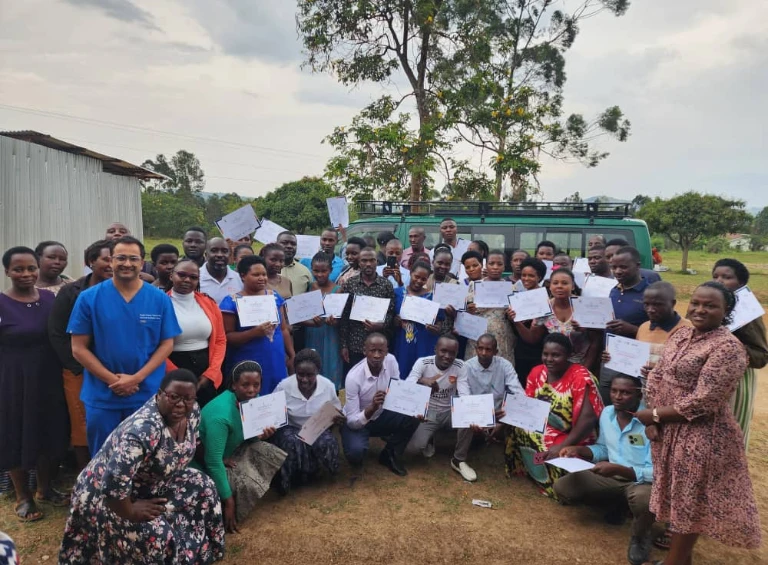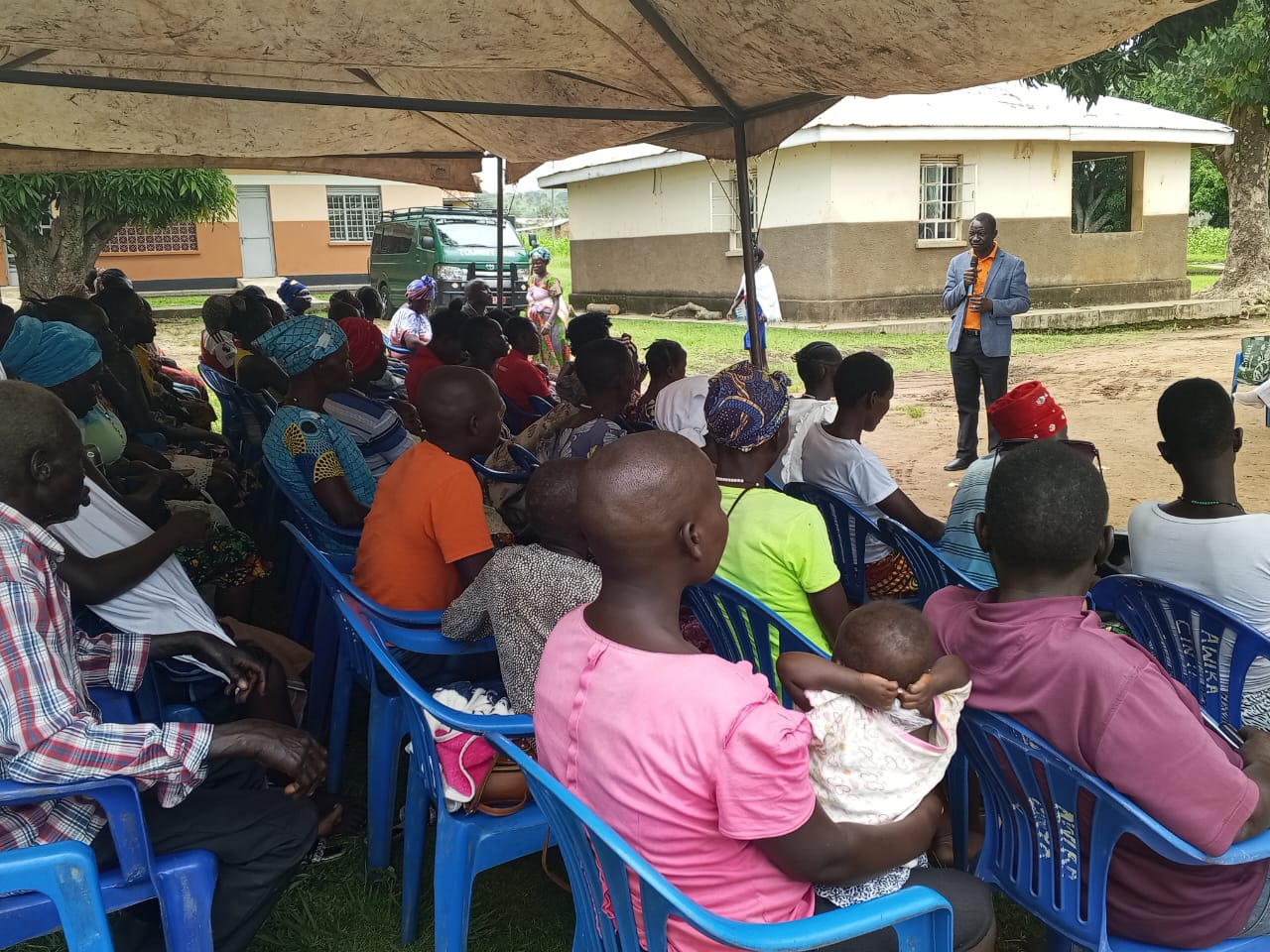- Article
- Source: Campus Sanofi
Scaling Hope: 1,000 Health Workers, 800,000 Women, One Pink October Mission
Discover how the power of partnerships is changing breast health awareness in rural and urban communities in Uganda and Zambia
Breast cancer remains a stark symbol of global health inequity. While survival rates have steadily improved in high-income countries, the disease continues to take a devastating toll in low- and middle-income countries (LMICs). By 2035, nearly two-thirds of all new cancer cases will occur in LMICs, with breast cancer continuing to be the most common cancer and leading cause of cancer-related death among women worldwide.
In Zambia and Uganda breast cancer is the second-most common cancer among women, with over 4,100 new cases and 2,000 deaths annually across both countries. In Uganda, breast cancer accounts for 23% of all cancer cases among women, and in Zambia, late-stage diagnosis is the norm, not the exception. Many factors contribute to these sobering figures. Systemic barriers hinder early detection, with most patients presenting with advanced-stage disease when treatment options are limited and survival rates are low. In the absence of any formal screening program, breast health awareness is the fundamental factor supporting earlier detection and increasing the chance of cure.
Collaborating to Build Bridges to Better Care
Recognizing the urgency of this challenge, our Global Health Unit (GHU) and Global Health Partnerships (GHP), formerly THET, have collaborated on a comprehensive health systems strengthening initiative with the goal to improve breast health awareness in rural and urban communities in each country. Not just a program – this initiative is a commitment to equity, resilience, and sustainable change.
"Our collective approach goes beyond simply providing resources,” explains Dr. Andrew Hockey, Oncology Therapeutic Area Lead, Sanofi’s Global Health Unit. “We're working together with our partners to create sustainable improvements in the entire continuum of care, from community awareness - empowering women to be alert to any change in their breast - to diagnosis and treatment. Our vision is that no woman in Zambia and Uganda is left without the resources and support they need in the fight against breast cancer."
The initiative brings together a powerful coalition of stakeholders, including Ministries of Health in both countries, local healthcare facilities, community health workers, patient advocacy groups, and international technical experts. This collaborative model ensures that solutions are co-created with local communities, respecting cultural contexts while addressing systemic challenges.
"We believe that lasting impact comes from building capacity within local health systems. This initiative shows what’s possible when international expertise meets local leadership. Every health worker trained becomes a catalyst for change, ensuring that breast health awareness and early detection remain embedded in communities long after the project ends," said Charles Omofomwan, Programmes Coordinator, Global Health Partnerships.
Over 1,000 healthcare workers completed training in August and September, preparing them to lead community sensitization events and education sessions throughout October and beyond. This achievement represents the first wave of a carefully designed cascade training model that extends expertise from international specialists to grassroots health workers.
The Ripple Effect: From Experts to Communities
Behind this rapid scale-up lies a partnership that blends international expertise with local needs. With GHU’s support, GHP engaged the UK’s Association of Breast Surgery (ABS) and Blended Learning UK (BLUK) to develop locally adapted educational materials.
The initiative aligns with national cancer control plans and delivers a tiered training model: senior doctors and nurses serve as Master Trainers, cascading knowledge to primary health practitioners and community health workers.
Dr. Alfred Jatho, Head of Cancer Services, Uganda Cancer Institute and Master Trainer shared, "... I joined as a Master Trainer because I believe in the power of early intervention. The training has equipped us with new skills—from interpreting breast imaging to optimizing referral pathways—that are already helping us reach more women, earlier. We’ve exceeded our training targets, and the enthusiasm from healthcare workers is inspiring. This initiative is not just saving lives—it’s transforming how we approach cancer care in Uganda."
Through this program, community health workers, a critical resource in underserved regions, are equipped with the skills to educate women about breast disease and breast self-examination, ensuring that knowledge reaches even the most remote communities.
Christine Mundambu, a community-based volunteer at Mushili Health Facility, Zambia offered her perspective, “I was motivated to attend the training because l wanted to learn or acquire more knowledge about breast cancer. I will be able to share the knowledge acquired with the community and at the facility on how to screen during my daily work and give full information so that cases may be detected early.”
This ripple effect and knowledge sharing ensures that breast health awareness reaches a growing number of people through an expanded network of care providers. The program aims to educate over 800,000 women and men across a total of five districts, empowering them to detect changes in their breasts and seek timely care.
Empowering Communities Through Awareness
Cultural stigma and lack of breast health awareness often prevent women and men from seeking timely care. To overcome this challenge, culturally sensitive campaigns were launched in partnership with traditional leaders and religious organizations. Additionally, breast cancer survivors are helping to reduce the stigma by serving as community champions, sharing their stories to inspire others. Pink October events that celebrate survivorship and raise awareness are also helping to shift perceptions in communities as well as encourage and educate on the importance of early detection.
The potential impact of the program extends beyond medical outcomes explains Dr. Banda Thandiwe, a Master Trainer and Medical Officer, Chipata Level 1 Hospital, Zambia, “This project will reduce stigma, fear, and late presentations of breast cancer by promoting awareness and access to screening. Earlier detection means better outcomes, less aggressive treatment, and reduced emotional and financial strain on families. In the long run, it strengthens women’s health and empowers communities.”
Looking Ahead: Learning for the Future
Early detection is the first pillar of the World Health Organization’s Global Breast Cancer Initiative and is essential to close the survival gap that exists between high- and low-income countries. Both Zambia and Uganda Ministries of Health are committed to tracking and evaluating the program’s impact, with the goal of scaling successful elements across broader health systems. Everyone who receives breast health awareness education gains lifelong knowledge and skills that can protect not only their health but the health of those in their family and community.
Through strategic partnerships, community empowerment, and support of health system strengthening, this initiative is not only designed to save lives—it is helping to restore hope and dignity to women across Zambia and Uganda. Together, we are changing the trajectory of breast cancer care.


.jpg)
